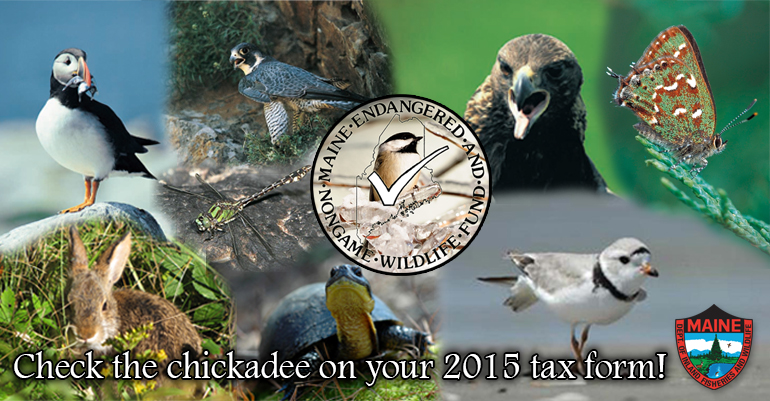February 2, 2016 at 2:23 am
 The Maine Department of Inland Fisheries and Wildlife conserves all of Maine’s wildlife for current and future generations. Hunting revenues provides funding for the management of game species such as deer, turkey, and bear, but funding for lesser known nongame species that can’t be hunted or trapped has been difficult to find.
Protecting these valuable species is vital as they comprise the vast majority of Maine’s diverse wildlife and fill valuable roles by contributing to water purification, pollination, and prey for larger species. However, many of these species face population declines due to habitat loss, pollution, roadkill, and other factors.
Most of the funding for the research and recovery effort of these valuable species comes from programs such as the federal State Wildlife Grant, which is only accessible to Maine with a state match. Many state matching dollars typically come from the Loon conservation license plate and volunteer contributions to the income-tax form via the Chickadee Check-off . These programs, which provide a means for everyone and anyone to support the wildlife they enjoy, flourished in the mid-1990s but have declined steadily since. By law, funds from the Chickadee Check-off and Loon Plates can only be used for conservation efforts for such species. When used as match for a federal grant, this dedicated fund is essentially doubled or tripled.
Monies from the State Wildlife Grant, matched with the Check-Off funds, have helped projects directed at conserving a plethora of species, including bald eagles, peregrine falcons, piping plovers, great blue herons, Canada lynx, several species of bats, New England cottontail, Blanding’s turtles and several rare freshwater mussels. Funds from the Check-Off have also aided citizen science projects like the Maine Butterfly Survey and the Maine Amphibian and Reptile Atlasing Project.
These species and many more depend on you. Please think of them when you file your taxes for 2015 by considering a contribution to the Chickadee Check-off on form Schedule CP. You can also view an annual Research & Management Report compiled and published by MDIF&W to, in part, document how nongame conservation funding gets generated and used.
The Maine Department of Inland Fisheries and Wildlife conserves all of Maine’s wildlife for current and future generations. Hunting revenues provides funding for the management of game species such as deer, turkey, and bear, but funding for lesser known nongame species that can’t be hunted or trapped has been difficult to find.
Protecting these valuable species is vital as they comprise the vast majority of Maine’s diverse wildlife and fill valuable roles by contributing to water purification, pollination, and prey for larger species. However, many of these species face population declines due to habitat loss, pollution, roadkill, and other factors.
Most of the funding for the research and recovery effort of these valuable species comes from programs such as the federal State Wildlife Grant, which is only accessible to Maine with a state match. Many state matching dollars typically come from the Loon conservation license plate and volunteer contributions to the income-tax form via the Chickadee Check-off . These programs, which provide a means for everyone and anyone to support the wildlife they enjoy, flourished in the mid-1990s but have declined steadily since. By law, funds from the Chickadee Check-off and Loon Plates can only be used for conservation efforts for such species. When used as match for a federal grant, this dedicated fund is essentially doubled or tripled.
Monies from the State Wildlife Grant, matched with the Check-Off funds, have helped projects directed at conserving a plethora of species, including bald eagles, peregrine falcons, piping plovers, great blue herons, Canada lynx, several species of bats, New England cottontail, Blanding’s turtles and several rare freshwater mussels. Funds from the Check-Off have also aided citizen science projects like the Maine Butterfly Survey and the Maine Amphibian and Reptile Atlasing Project.
These species and many more depend on you. Please think of them when you file your taxes for 2015 by considering a contribution to the Chickadee Check-off on form Schedule CP. You can also view an annual Research & Management Report compiled and published by MDIF&W to, in part, document how nongame conservation funding gets generated and used.